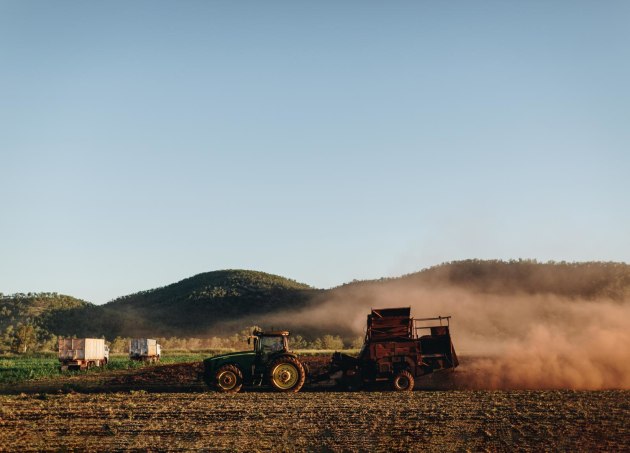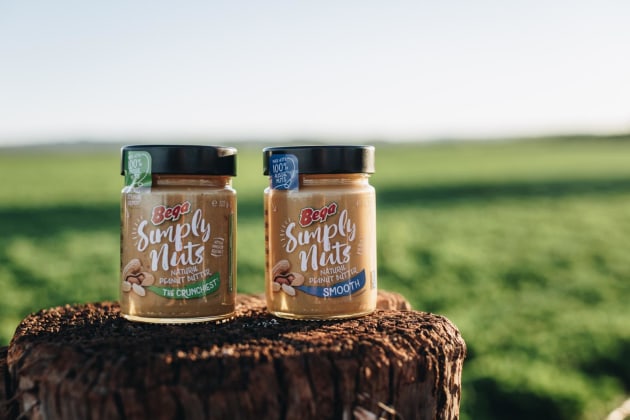Bega Foods holds unparalled market share when it comes to peanut butter. Kim Berry talks to fifth generation peanut farmer Ben Rackemann about what it means to produce the main ingredient for one of Australia’s most loved spreads. This article first appeared in the August 2021 issue of Food and Drink Business.
Bega has had a big year. Its $528 million acquisition of Lion Dairy & Drinks more than doubled the size of the company, its revenue and number of employees. Branded products now account for 80 per cent of the business, compared to 59per cent pre-acquisition.
The company also saw the completion of two lengthy legal proceedings, both resolved in its favour. In February, the Victorian Supreme Court ruled Bega was permitted to use the Bega trademark on products outside the scope of the licence Fonterra has for Bega branded cheese and butter products.

In June, it was awarded a $9.25 million settlement from Kraft Heinz Australia over its longstanding dispute regarding Bega rebranding Kraft Peanut Butter products after it bought the Kraft factory from Mondelez in 2017.
Meanwhile, the production line must go on and for that to happen, the ingredients must besupplied.
Bega’s peanut butter portfolio – Bega Peanut Butter and Simply Nuts – accounts for almost 60 per cent of Australia’s peanut butter market.
Bega head of marketing Matt Gray tells Food & Drink Business nut spreads are one of the most popular categories in the supermarket aisle.
“In the last year alone, the natural peanut butter segment grew 15.6 per cent, with consumers placing a strong focus on health and looking to extract as many positive benefits from the products they consume as possible.
“We introduced the Simply Nuts range in 2019 to cater to that demand, with the products only containing peanuts and a pinch of salt,” Gray says.
In 1H FY21, Simply Nuts doubled its market share to 21per cent of the natural peanut butter segment while its core peanut butter range holds around 82 per cent of the total core peanut butter market.
For such a dominant player in the market, with a product that has so few ingredients, it is essential the core ingredient, peanuts, is of the highest quality.
Bega Foods executive general manager Adam McNamara says Australian peanut growers continue to face challenging growing conditions even though this year is expected to be the best in the last five.

“We’re thrilled that we’ve had a strong number of growers who hadn’t grown peanuts for the last five years returning to growing, as well as new growers starting to grow peanuts in regions like North Queensland,” McNamara says.
“So much hard work has gone into this year’s crop, and we would like to thank each peanut grower for their commitment and passion for producing peanuts for Australians.”
In the blood
Fifth generation peanut farmer Ben Rackemann’s property is in Coalstoun Lakes, Queensland, about four hours north of Brisbane.
“I returned to the family farm about five years ago. After university I worked in a corporate job, but I’ve always loved farming. I’m a fifth-generation peanut farmer, it’s in my blood,” he tells Food & Drink Business.
“Growing peanuts is a passion of ours, and last year we weren’t able to plant a crop due to the dry conditions. This season’s harvest really is so special – for us I’d say it’s the best harvest in the last 10 years,” he says.
Since Rackemann returned to the land, the region has been in constant drought, and he doesn’t see it changing. He has implemented many regenerative farming methods for soil and water conservation to help with the drying climate.
“We are farming in some very challenging times, and we all have to adapt our farming practices,” he says.
But when harvest time arrives, Rackemann says it is all worth it.

“Harvest is the thing I like most about peanut farming. It’s a culmination of not only the past twelve months of work, butalso the previous year’s changes and advancement in farming practices.”
For Rackemann, one of the biggest positive changes he hasseen is an increase in the crop’s popularity.
“Peanuts are a legume, and more and more farmers are seeing the benefits of growing them. They add valuable nitrogen back into the soil and therefore reduce the reliance on artificial fertilisers.
“The industry is growing, andI believe it has a great future for Australian farmers,” Rackemann says.
Once harvested, Rackemann’s peanuts and those from the key Queensland growing regions of Bundaberg, Kingaroy, Brisbane Valley and North Queensland are shipped to Bega’s Kingaroy facility, the Peanut Company of Australia, where they are prepared to be turned into the peanut butter so many love.








